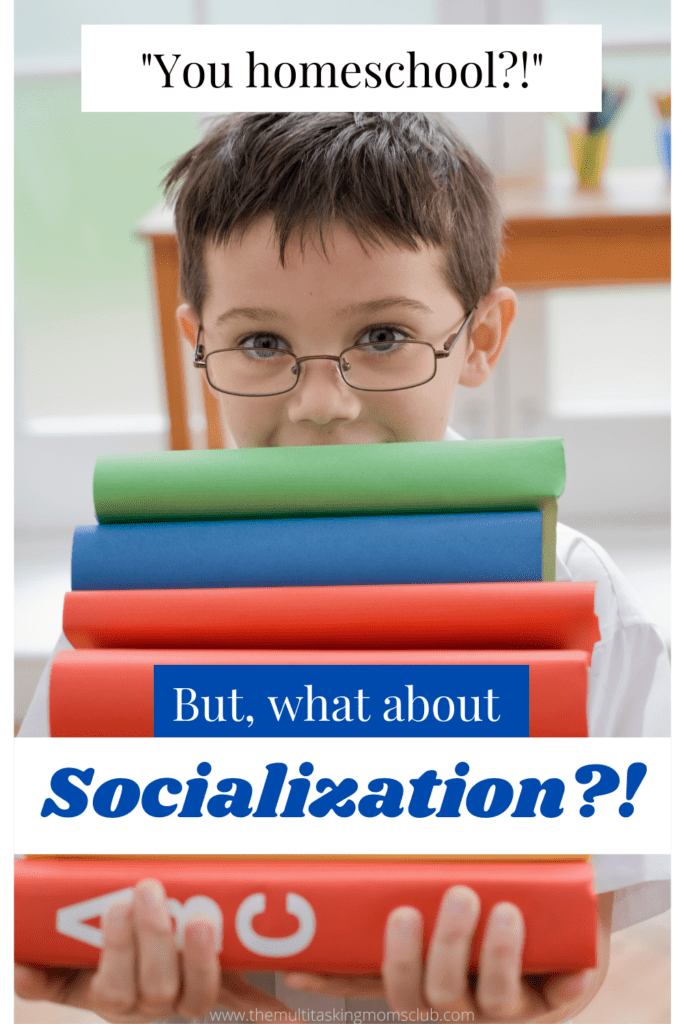“But, what about socialization?” It’s the single most asked question about homeschooling and, honestly, the most eye-roll-inducing question for most homeschoolers.
First, to quote the venerable Inigo Montoya from The Princess Bride, “I don’t think that word means what you think it means.”
“Socialization” is the act of learning how to properly interact with others. Whether parents acknowledge it or not, they *are* teaching socialization skills to their children regardless of where their child attends school.
Yes, you, mom and dad, are already responsible for your child’s socialization. Your children are learning from watching you. How you treat your spouse, the waiter, the mailman; how you talk about your boss or neighbors at the dinner table. This is how your children are learning how to interact with others.
“Socializing”, on the other hand, is utilizing opportunities to put those socialization skills to use in the broader world.
Now that we have distinguished the difference, the question changes from “What about socialization?” to “How do I provide enough opportunities for my children to socialize?”

This post may contain affiliate links. Please see my Disclosure page for details. As an Amazon Associate I earn from qualifying purchases.
Good news! Socializing your homeschooler is not rocket science!
To properly socialize your children you need to give them ample opportunities for both structured and unstructured time with other children.
Structured time means an organized class or team, preferably led by another adult other than you so that your child will get to practice interacting with other adults.
Examples of structured socializing for homeschoolers would be participating in organized sports like soccer or Little League.
Dance classes and karate classes also offer structure.
Other examples: taking classes at a homeschool co-op, learning art at a local studio, Sunday School or Catechism classes, community theater, or community children’s choir.
The possibilities are nearly endless!
Unstructured time means ample opportunities to interact with other children without an adult-led agenda.
Let the kids decide what to do. Let them formulate, play, create, and compromise on their own.
Examples of unstructured time would be play dates at the park, having friends over to play. or just hanging out with the neighborhood kids.
Let them build a fort, start a band, create a game. Let them be bored around other children so that this group of youngsters will develop a desire to use their imaginations. Let your kids, be kids!
While here be sure to check out these trending posts!
- List of Homeschool Electives
- Bible Verses for Encouragement
- Create a Cozy Home – 20 Tips
- How to Get Rid of Ants in Your Home Using Borax
- Bible Verses to Pray for Your Son
Truth About Homeschoolers and Socialization
Dr. Medlin of Stetson University reviewed homeschool socialization studies and came to this conclusion:
Homeschool children are taking part in the daily routines of their communities. They are certainly not isolated, in fact, they associate with – and feel close to – all sorts of people… [homeschooled children] have good self-esteem and are likely to display fewer behavior problems than other children. They may be more socially mature and have better leadership skills than other children as well. And they appear to be functioning effectively as members of adult society.
Richard G. Medlin, Ph.D. “Homeschooled Children’s Social Skills” (Medlin, 2000, p. 119)
The truth is that many children do better learning socialization skills from being with their parents more often. Trusting the schools to teach your children how to interact with others potentially means they will pick up those skills – more often than not – from other children who have not yet mastered the art of social interaction themselves.

Consider this: Children’s Socialization
Institutionally educated children are placed in an artificial environment – grouped together based on year of birth – inside four walls, away from society in order to learn how to behave in society.
Homeschooled children learn how to behave in society by actually spending time most days out and about… you know… in society!
This type of “on-the-job” training for life in the real world often means that homeschooled children are better socialized than other children.
